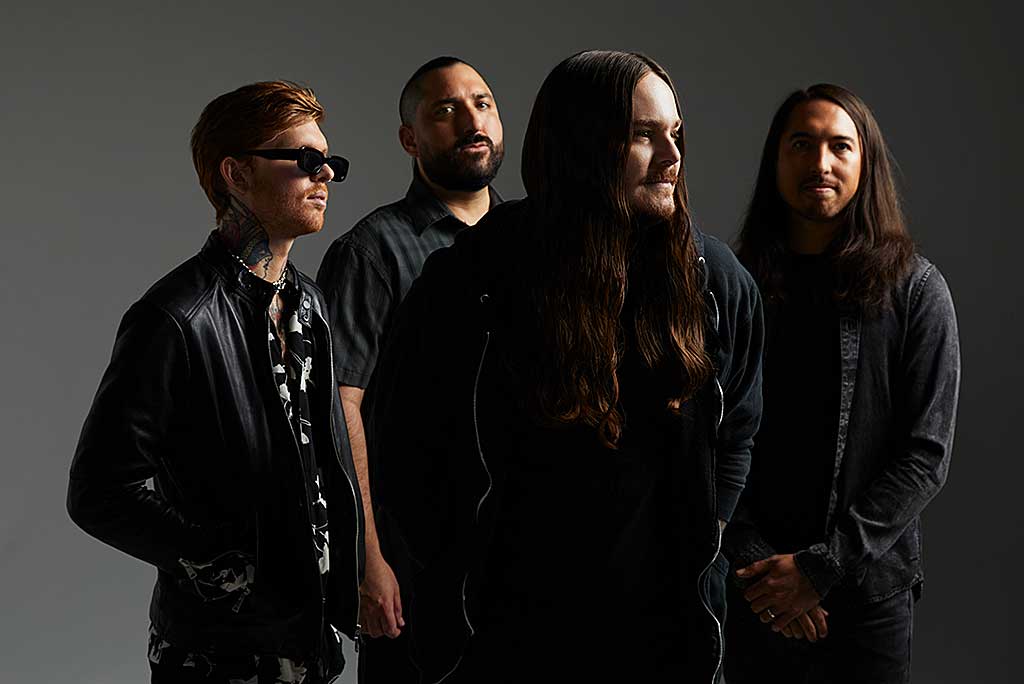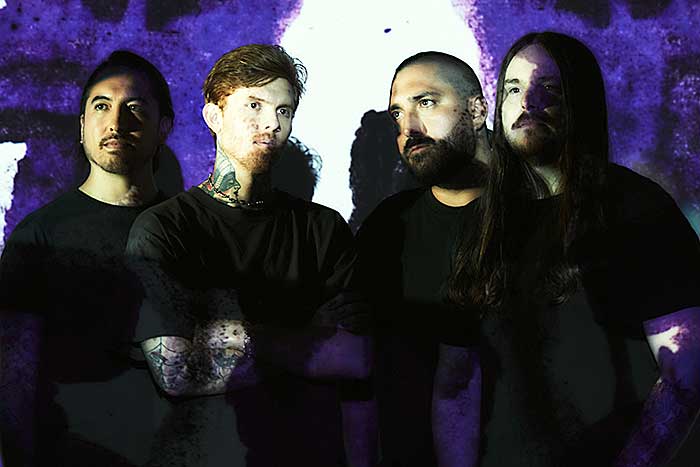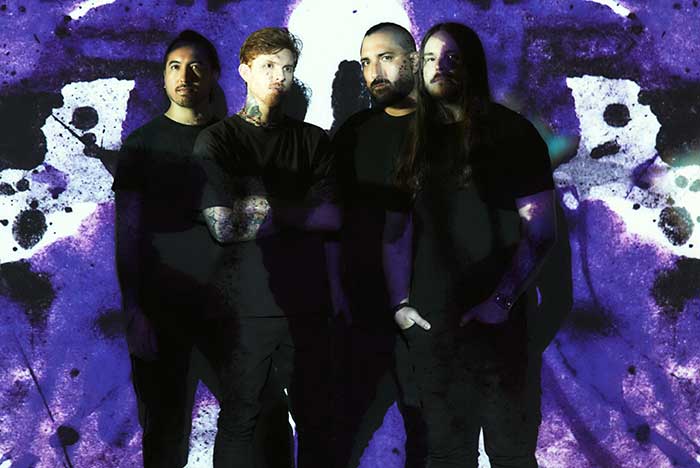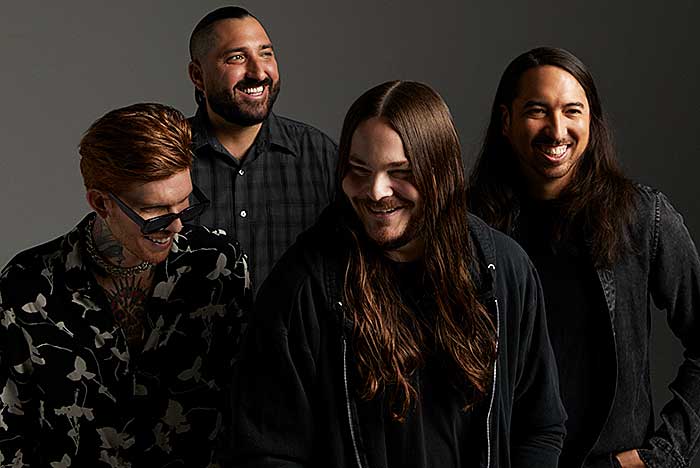
INTERVIEW WITH AARON PAULEY AND TINO ARTEAGA BY SAMMIE STAR
Looking at Of Mice & Men’s success over the previous 13 years since their self-titled debut in 2010, many might assume that the band with such a prestigious career would have the attitude to match the accolades they have received thus far in their journey. Surprisingly, such musical royalty has remained down-to-earth, devoted, and emotionally in tune with themselves since their debut. Of Mice & Men, one of the most individual and prolific bands in metalcore, continues to expand artistically and stay honest in its songwriting. Although most bands would attribute this to the hard work over the years, Of Mice & Men claims it’s more about pursuing the excitement of the moment.

“I honestly think it’s chasing the exciting moments when we are collaborating and writing music,” explains vocalist Aaron Pauley. “It becomes easy, especially as you achieve some success. It’s very easy to choose that as a model, but you end up getting too formulaic with things. Whereas we try to focus on the excitement factor when we’re writing together, and not always just writing exciting sounding songs, but chasing those little moments where a spark of creativity happens where two people’s ideas combined become greater than the sum of both.”
“WE TRY TO FOCUS ON THE EXCITEMENT FACTOR WHEN WE’RE WRITING TOGETHER”
“We wholeheartedly love to create music,” says drummer Tino Arteaga. “We are all musicians at the start of the day, and I believe we all admire and respect each other’s artistic integrity since we are able to be in a creative group or band together. For us, being creative musicians is what keeps us going and the fact that we can bounce ideas off each other. It may not be the most amazing concept, but the exciting part is sharing it and witnessing someone else’s excitement. Then we extrapolate and fall down a few rabbit holes to develop something we never thought was possible. That has been the case since the beginning. Whenever we are writing music or creating something, we use each other as a barometer for excitement.”

Instrumentally, their impromptu process took the band to new heights on Echo, solidifying the roots they had built on 2018’s Defy. On the band’s latest album, Tether, they take a unique internal approach, focusing explicitly on the sound and emotion for a more impactful listening experience.
“A LOT OF SOUND TEXTURES WERE THE COLOR OR VIBE PALETTES FOR THE SONGS”
“A lot of the sound design is a progression from the last record,” Pauley surmises. “We took a bit of a creative risk—well, maybe risk is not the right word (laughs)—more of a creative side quest in how we approached the sound design elements in Echo compared to other previous albums. Even going back to Defy and Earthandsky, even going back as far as when I joined the band with Restoring Force back in 2013, as far back as we have been doing this, we have always enjoyed this aspect of the process. The ear candy stuff (laughs), the post-production stuff, was always purposely in the background. It was never the focal point. With Echo, we wrote a few songs where that started to be the focal point, and a lot of sound textures were the color or vibe palettes for the songs. Having seen some success in terms of how it connects the emotion of things to the audience, that inspired us to try to do more of that with this record—find a color palette in the sound design that already hugely conveys the emotion of the work and build up around that. Which is cool, too, because after doing seven records, when you’re creating your eighth, you look for ways to make it fun and interesting.”

“We challenged ourselves with this record. We started at the end and worked backward,” adds Arteaga. “We started at a point where the embellishments were where the songs began. We are musicians, so we think in terms of our instruments. After hearing how well we were able to capture that in Echo, it inspired us to go deeper. A lot of times, we think people are going to listen to the record live. We have been a live band for such a long time. That’s been a huge part of the ethos of what our band does. That was taken away a few years ago. Now the experience is more aural. So, when we are creating music now, while we always used headphones, this is now the first way our music is going to be consumed. In a lot of ways, we wanted to transport the listener to another world, not just four guys playing instruments in a recorded room. It’s a cool feeling to listen back and feel that we have achieved that with the last album and this one, and to know that we are the producers of these records.”
“WE WANTED TO TRANSPORT THE LISTENER TO ANOTHER WORLD, NOT JUST FOUR GUYS PLAYING INSTRUMENTS IN A RECORDED ROOM”
This method would not only inspire them to travel further into their aural environments, but it would also allow them to transcend lyrically. Echo was an album that delved further into the weight of melancholy, loss, finality, and the pessimism of a worldwide pandemic. Tether explores despair, anxiety, loneliness, and how art can overcome such overwhelming and tenebrous emotions. While Echo was more of an exterior record, Of Mice & Men intended to go deeper within themselves to make Tether. For the band, it was more than just talking about these feelings. It was an introspective dive into why we feel these emotions.

“Echo was a lot of releases and cathartic,” Pauley laughs. “Tether is more from a lyrical point of view, putting everything on the table, almost like the hope of problem solving or making sense of it. Tether is more of an introspective record, whereas Echo is more of a raw emotional expression at times. It has its moments where it’s more cerebral, but given the context of what that record was about, it was more of an outpouring. Tether is a bit more introspective. It still has its share of outpouring, because that is what we tend to do. From a lyrical point of view, it’s putting everything out there and trying to make sense of it. A lot of that just has to do with age. When we started this, we were all in our early 20s, and we are now in our mid-30s. Life happens now; life is real. You become aware of the fact that time goes quickly. That in itself is a complex feeling. The Japanese call it ‘The gentle sadness of the passing of time.’ Looking at all of that, Tether is the logical emotional step from Echo.”






















